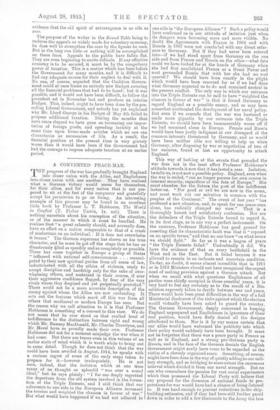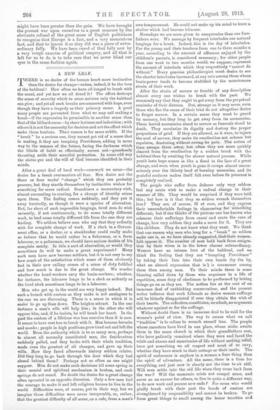A CONVERTED PEACE-MAN. T HE progress of the war has gradually
brought England into closer union with the Allies, and Englishmen into closer uuion with one another. They have realized what a German victory would moan for themselves, for their allies, and for every nation that is not pre- pared to sit at the feet of the conqueror and gratefully accept his permission to go on living. An interesting example of this process may be found in an excellent little book by Professor L. T. Hobhouse, The -World in ,Conflict (T. Fisher Tinwin, 1s. net). There is nothing uncertain about his conception of the situation, or of the manner in which it must be handled. He realizes that "a great calamity should, and normally does, have an effect on a nation comparable to that of a crash of misfortune on an individual.. If it does not overwhelm it braces." The German superman has shown us his true character, and he must be got off the stage that he has so disastrously 411ed as speedily and as completely as possible. There has come togethe'r in Europe a group of States " inflamed with national self-consciousness . . . emanci- pated by their new spiritual guides from all sense of law, indoctrinated with all the ethics of violence, ready to accept discipline and hardship only for the sake of over- whelming others, and sustained in their course, if over their aggressive confidence flagged, by fear of the very rivals whom they despised and yet perpetually provoked.' There could not be a more accurate description of the enemy against whom the Allies are now contending. It sets out the features which mark off this war from all others that mediaeval or modern Europe has seen. But the reason why we call attention to it is that Professor Hobhouse is something of a convert to this view. We do not mean that lie ever stood on that exalted level of indifference to the distinction between right and wrong which Mr. Ramsay MacDonald, Mr. Charles Trevelyau, and Mr. Morel have so proudly made their own. Professor Hobhouse did not for a moment misjudge the war when it bad come. But there are traces oven in this volume of an earlier state of mind which it is worth while to bring out in some detail. Though he does not think that the war could have been avoided in August, 1914, he speaks with a 'curious regret of some of the early steps taken to prepare for it—howevor inadequately. He is not sure, indeed, that the isolation which at one time many of us thought so splendid. "was ever a sound ideal," but he says plainly : "I for one deeply regretted the departure from the old system involved in the forma- tion of the Triple Entente, and I still think that our adherence to one side in the European Alliance increased the tension and weighted the chances in favour of war." But what would have happened if we had not adhered to one side in "the European Alliance " ? Such a policy would have confirmed us in our attitude of isolation just when its dangers were becoming more and more visible. No doubt the Agreements with France in 1904 and with Russia in 1907 were not concluded with any direct refer- ence to Germany. But if they had never been entered into—if we had stood apart from Germany on the one side and from France and Russia on the other—what fate could we have looked for at the hands of Germany when she had first annihilated France as a Great Power and next persuaded Russia that with her she had no real quarrel ? We should have been exactly in the plight which would have been reserved for us if we had done what Germany expected us to do and remained neutral in the present conflict. The only way in which our entrance into the Triple Entente can be said to have "weighted the chances in favour of war" is that it forced Germany to regard England as a possible enemy, and so may have somewhat accelerated the development of her naval policy. But even if we concede that the war was hastened or made more gigantic by our entrance into the Triple Entente, we should have been immeasurably worse off if we had remained alone in Europe. France and Russia would have been justly indignant at our disregard of the common interests threatened by Germany, and so would have been neither able nor willing to help us when Germany, after disposing by war or negotiation of two of her enemies, found at last an opportunity to attack England.
This way of looting at the events that preceded the war does not in the least affect Professor Hobliouse's attitude towards it now that it has lasted a year. Isolation, he tells us, is not now a possible policy. England, even when the war is ended, "can no longer pursue her own course in internal security, regardless of the fate of Europe." She must abandon for the future the psrt of the indifferent looker-on. "For good or evit we are now in the arena, and. must work out our salvation in common with the peoples of the Continent." The event of last year "has produced a new situation, and, to speak for one peace-man alone, has radically changed my view." That is a thoroughly honest and satisfactory confession. Nor are the defenders of the Triple Entente bound to regard it, in its first stage, as in any way a perfect instrument. On the contrary, Professor Hobliouse has good ground for asserting that its characteristic fault was that it " reposed on no specific terms," and that no one knew "on what terms we should fight." So far as it was a league of peace "the Triple Entente failed." Undoubtedly it did. We have the evidence of that on every 'battlefield in the West and in the East. But it failed because it was allowed to remain in an inchoate and uncertain condition. To-day, no doubt, it seems almost incredible that in 1911 or in 1913 Ministers should not have recognized the urgent need of making provision against a German attack. But when we recall with what questions Englishmen of all parties were chiefly occupied in those eventful years, it is very hard to feel any certainty as to the result of a Dis- solution expressly taken to decide between war and peace. There would have been great difficulties in the way of a full Ministerial disclosure of the risks against which the electors would virtually have been asked to guard the country. The German Government, deeply concerned in keeping England unprepared and Englishmen in ignorance of their real position, would have flatly denied all the designs attributed to them. Nor is it by any means certain that our allies would have welcomed the publicity into which their policy would suddenly have been brought. It must not be forgotten that there was a peace party in France as well as in England, and a strong pro-German party in Russia, and in the face of the German denials the English Government might easily have come to be regarded as the victim of a cleverly organized scare. Something, of course, might have been done in the way of quietly adding to our mili- tary strength, and so bridging to some extent the enormous interval which divided it from our naval strength. But no one who remembers the passion for vast social experiments which then possessed the Liberal Party will believe that any proposal for the diversion of national funds to pre- parations for war would have had a chance of being listened to. It was hard enough to prevent reductions in the ship- building estimates, and if they had been still further pared down in order to add a few thousands to the Army the loss might have been greater than tho gain. We have brought the present war upon ourselves in a great measure by the obstinate refusal of the great mass of English politicians to recognize that Europe is a fact, and a very momentous fact, and that to ignore it as they did was a piece of extra- ordinary folly. We have been cured of that folly now- by a very rough exercise of political surgery, and all that is left for us to do is to take care that we never blind our eyes in the same fashion again.



































 Previous page
Previous page